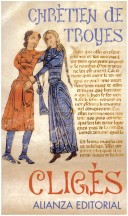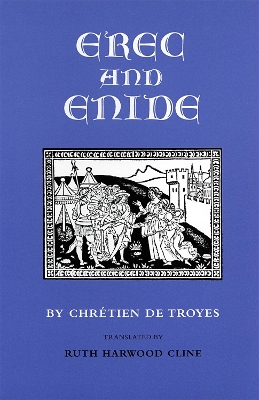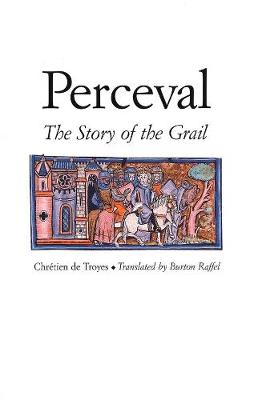Chretien de Troyes (YUP)
5 total works
Cliges is generally thought to be the second of Chretien's Arthurian romances, probably written between 1185-87. This critical edition of Cligesis the first since Wendelin Foerster's in (1884) to take account of all the manuscripts. Based on the Guiot manuscript, it contains many emendations, producing a text closer to that of Chretien's original. Variant apparatus, notes, glossary, and editorial comment on the manuscripts accompany the text.
STEWART GREGORY is in the Department of French, Leicester University; the late CLAUDE LUTTRELL was formerly in the Department of English at the same university, and is known for his books and articles on 12c French Arthurian romance.
STEWART GREGORY is in the Department of French, Leicester University; the late CLAUDE LUTTRELL was formerly in the Department of English at the same university, and is known for his books and articles on 12c French Arthurian romance.
Erec and Enide marks the birth of the Arthurian romance as a literary genre. Written circa 1170, this version of the Griselda legend tells the story of the marriage of Erec, a handsome and courageous Welsh prince and knight of the Round Table, and Enide, an impoverished noblewoman. When the lovers become estranged because Erec neglects his knightly obligations, they subsequently ride off together on a series of adventures that culminate in their reconciliation and the liberation of a captive knight in an enchanted orchard.
An innovative poet working during a time of great literary creativity, Chrétien de Troyes wrote poems that had a lively pace, skillful structure, and vivid descriptive detail. Ruth Harwood Cline re-creates for modern audiences his irony, humor, and charm, while retaining the style and substance of the original octosyllabic couplets. Her thorough introduction includes discussions of courtly love and the Arthurian legend in history and literature, as well as a new and provocative theory about the identity of Chrétien de Troyes. This clearly presented translation, faithful in preserving the subtle expressive qualities of the original work, is accessible reading for any Arthurian legend aficionado and an ideal text for students of medieval literature.
An innovative poet working during a time of great literary creativity, Chrétien de Troyes wrote poems that had a lively pace, skillful structure, and vivid descriptive detail. Ruth Harwood Cline re-creates for modern audiences his irony, humor, and charm, while retaining the style and substance of the original octosyllabic couplets. Her thorough introduction includes discussions of courtly love and the Arthurian legend in history and literature, as well as a new and provocative theory about the identity of Chrétien de Troyes. This clearly presented translation, faithful in preserving the subtle expressive qualities of the original work, is accessible reading for any Arthurian legend aficionado and an ideal text for students of medieval literature.
The twelfth-century French poet Chretien de Troyes is a major figure in European literature. His courtly romances fathered the Arthurian tradition and influenced countless other poets in England as well as on the continent. Yet because of the difficulty of capturing his swift-moving style in translation, English-speaking audiences are largely unfamiliar with the pleasures of reading his poems.
Now, for the first time, an experienced translator of medieval verse who is himself a poet provides a translation of Chretien's major poem, Yvain, in verse that fully and satisfyingly captures the movement, the sense, and the spirit of the Old French original. Yvain is a courtly romance with a moral tenor; it is ironic and sometimes bawdy; the poetry is crisp and vivid. In addition, the psychological and the socio-historical perceptions of the poem are of profound literary and historical importance, for it evokes the emotions and the values of a flourishing, vibrant medieval past.
Now, for the first time, an experienced translator of medieval verse who is himself a poet provides a translation of Chretien's major poem, Yvain, in verse that fully and satisfyingly captures the movement, the sense, and the spirit of the Old French original. Yvain is a courtly romance with a moral tenor; it is ironic and sometimes bawdy; the poetry is crisp and vivid. In addition, the psychological and the socio-historical perceptions of the poem are of profound literary and historical importance, for it evokes the emotions and the values of a flourishing, vibrant medieval past.
Originlly published in 1984, this book contains the full text of Lancelot or, The Knight of the Cart, the third or fourth major work by the twelfth-century poet Chretien de Troyes, alongisde a full translation and textual notes.
One of the most influential storytellers in Western literature, French poet Chrétien de Troyes helped to shape the ever-fascinating legend of King Arthur and the Round Table. Of Chrétien's five surviving romantic Arthurian poems, the last and longest is Perceval, an unfinished work that introduces the story of the Grail—a legend quickly adopted by other medieval writers and taken up by a continuing succession of authors. In Chrétien's romance, Perceval progresses from a naive boyhood in rural seclusion to a position of high respect as a knight at Arthur's court. With the help of two teachers—his mother and Gornemant of Goort—Perceval is ultimately able to reject the worldly adventures chosen by other knights and seek important moral and spiritual answers.
Acclaimed for his sensitive and faithful translations of the poems of Chrétien, Burton Raffel completes the Arthurian series with this rendition of Perceval. Raffel conveys to the modern English language reader all the delights of Chrétien’s inventive storytelling, perceptive characterizations and vividly evoked emotions.
Acclaimed for his sensitive and faithful translations of the poems of Chrétien, Burton Raffel completes the Arthurian series with this rendition of Perceval. Raffel conveys to the modern English language reader all the delights of Chrétien’s inventive storytelling, perceptive characterizations and vividly evoked emotions.



